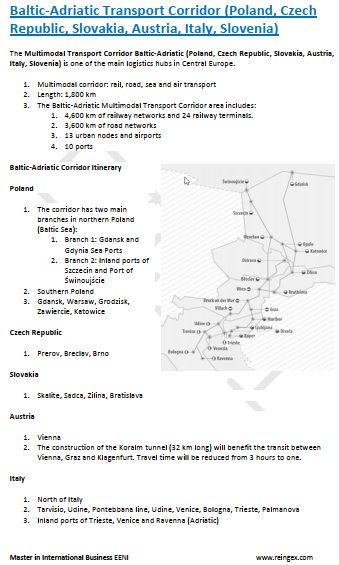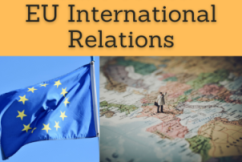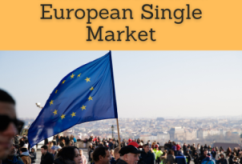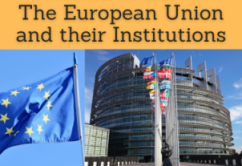Business in Austria, Vienna. Austrian Economy
Austrian Foreign Trade (Doing Business in Austria) Tourism, Logistics

The Republic of Austria is one of the richest countries in the world, with a per capita income of EUR 38,500
Headquarters of the UN Commission on International Trade Law (UNCITRAL) and FIATA
- Introduction to the Republic of Austria (EU)
- Austrian Economy
- Doing Business in Vienna
- Austrian Foreign Trade
- Transport and Logistics
- Investment in Austria
- Largest Austrian companies
- Access to the Austrian Market
- Business Plan for Austria

The educational aims of the Subject “Foreign Trade, Logistics and Business in Austria” are:
- To analyze the Austrian Economy, Logistics and Global Trade
- To conduct research on business opportunities in the Austrian Market
- To analyze the Austrian trade relations with the student's country
- To learn about Austrian Trade Agreements as a member of the European Union
- To develop a business plan for the Austrian Market

The Subject “Foreign Trade, Logistics and Business in Austria” is included within the curriculum of the following academic programs at EENI Global Business School:

Masters: International Business, Foreign Trade.

 Masters adapted to Austrian Students.
Masters adapted to Austrian Students.
Languages:  +
+  Austria
Austria  Autriche
Autriche  Austria.
Austria.
- Subject Credits “Doing Business in Austria”: 1

International Trade, Logistics and Business in Austria

- Baltic-Adriatic Corridor (Poland, Slovenia)
- Access to the Pan-European Corridor II



Preferential Access and Trade Agreements of Austria
- Austria and the European Economic Area
- The EU
- As a member of EU, Austria is a beneficiary of EU Trade Agreements with South Africa, South Korea, Bharat (India), Mexico, MERCOSUR, Egypt etc
- Economic and Monetary Union
- European Customs Union
- European Single Market
- The European Union Services Directive
- European Digital Single Market
- Central European Initiative
- Regional Cooperation Council
- Organization of the Black Sea Economic Cooperation (observer country)


- World Trade Organization (WTO)
- Agreement on Trade in Services (GATS)
- Agreement on the Application of Sanitary Measures
- Agreement on Technical Barriers to Trade
- Agreement on Preshipment Inspection
- Agreement on Safeguards
- Trade Facilitation Agreement
- World Customs Organization (WCO)
- Kyoto Convention
- Convention on the Harmonization of Frontier Controls of Goods
- CMR Convention (UN)
- Hamburg Rules
- Customs Convention on Containers
- COTIF Convention
- BIC (Containers)
- Chicago Convention (ICAO)
- International Maritime Organization (IMO)
- Convention for Safe Containers
- Istanbul Convention
- International Road Transport Union (IRU)
- TIR Convention
- Guidelines on Safe Load Securing for Road Transport
- CIM, CIT Rail Rules
- International Chamber of Commerce

European Trade and Economic Organizations of Austria
- European Union
- European Central Bank
- European Investment Bank
- European Bank for Reconstruction and Development (EBRD)
- European Union-CELAC Summit
- Economic Commission for Europe (UNECE)

- Organization for Economic Cooperation and Development (OECD)
- Inter-American Development Bank
- Asian Development Bank
- African Development Bank
- United Nations
- World Bank
- World Trade Organization (WTO)
- International Monetary Fund
- OSCE. The headquarters of the OSCE are in Vienna
- Asia-Europe Meeting
- Austrian Capital: Vienna
- Languages of Austria: German (official), Hungarian and Slovenian
- Area of Austria: 83,871 km²
- Austrian Population: 8.5 million people
- Type of Government: Parliamentary Federal Republic
- Borders of Austria: Czech Republic, Germany, Slovakia, Hungary, Slovenia, Italy, Switzerland and Liechtenstein
- Austria is a landlocked country
Religion in Austria: Catholicism -73% of the Austrian population- (Christianity).
Austria belongs to the European Economic Area.
Economy of Austria.
- Austrian GDP (nominal): 398 million dollars
- Major economic downturn in 2011
- Austrian Currency: Euro
- Austria joined the EU in 1995
- Main economic sectors: tourism, vehicles, foods, machinery, chemical products, paper

Austrian Foreign Trade.
- Main Austrian Exports are machines, vehicles, paper, foods, chemical products, steel, textiles
- Germany is the largest trading partner of Austria
- Top Austrian export markets are Germany (31%), Italy, Switzerland, the United States
- Main Austrian import sources are Germany (45), Switzerland, Italy, the Netherlands
(c) EENI Global Business School (1995-2025)
Top of this page









 WhatsApp
WhatsApp